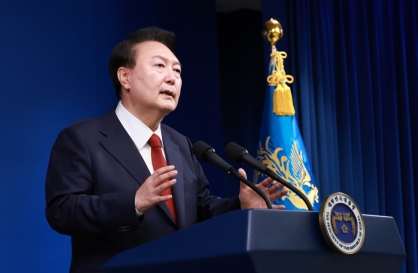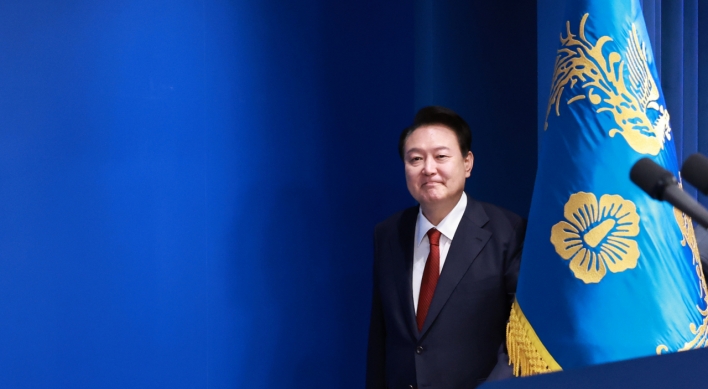Park receives mixed reviews for first 100 days in office
Approval high on N.K. policy, low on domestic politics
By Korea HeraldPublished : June 3, 2013 - 20:34
President Park Geun-hye marks her 100th day in office Tuesday, as the North Korea standoff and a series of appointment blunders continue to overshadow her main agenda of boosting welfare and creating a “fair” economy.
Various polls showed her approval ratings rebounding to more than 50 percent, with majorities praising her North Korea policies but criticizing her communication skills and personnel management style.
During the first few months considered crucial for picking up the momentum to plough through opposition with key policy initiatives, Park lost precious time due to a series of personnel flops, the most recent one being spokesman Yoon Chang-jung, who was fired over sexual assault allegations, observers said.
“Even the issue of North Korea was something that the administration was forced to deal with as it was happening upon Pyongyang’s provocations, rather than it being a policy that the Park government took the initiative in,” said Yoon Hee-woong, senior researcher at the Korea Society Opinion Institute.
Pundits also said scores of policy initiatives, including to achieve a creative economy, economic democratization and trust-building, were bombarding the public without a consistent message or clear direction, creating conflict among policymakers and authorities.
“Still, what we need to keep in mind is that the two major tasks faced by us, which are the economy and North Korea, are things that will not be solved immediately even if the government takes the initiative, as they are intertwined with diplomatic and global settings,” said politics professor Yoon Pyung-joong of Hanshin University.
“What Park can do, on the other hand, to see immediate results is to improve domestic politics. It is entirely up to her to give more say to the ruling party and to actually act on her promise to treat the opposition as a partner. That will then create the social mood of integration and unity,” Yoon said.
Various polls showed her approval ratings rebounding to more than 50 percent, with majorities praising her North Korea policies but criticizing her communication skills and personnel management style.
During the first few months considered crucial for picking up the momentum to plough through opposition with key policy initiatives, Park lost precious time due to a series of personnel flops, the most recent one being spokesman Yoon Chang-jung, who was fired over sexual assault allegations, observers said.
“Even the issue of North Korea was something that the administration was forced to deal with as it was happening upon Pyongyang’s provocations, rather than it being a policy that the Park government took the initiative in,” said Yoon Hee-woong, senior researcher at the Korea Society Opinion Institute.
Pundits also said scores of policy initiatives, including to achieve a creative economy, economic democratization and trust-building, were bombarding the public without a consistent message or clear direction, creating conflict among policymakers and authorities.
“Still, what we need to keep in mind is that the two major tasks faced by us, which are the economy and North Korea, are things that will not be solved immediately even if the government takes the initiative, as they are intertwined with diplomatic and global settings,” said politics professor Yoon Pyung-joong of Hanshin University.
“What Park can do, on the other hand, to see immediate results is to improve domestic politics. It is entirely up to her to give more say to the ruling party and to actually act on her promise to treat the opposition as a partner. That will then create the social mood of integration and unity,” Yoon said.

Surveys conducted ahead of the Park administration’s 100th day showed around 52 percent public approval.
Gallup Korea’s poll conducted on May 27-30 on 1,216 adults showed that 52 percent of the respondents believed Park was doing a good job, as opposed to 23 percent who did not.
Park’s approval ratings had hovered at around 40 percent since she took office until April due to consecutive withdrawals of high-post nominees over allegations of ethical misdeeds and consequent delays in launching the Cabinet. Then from early May, the ratings started to pick up mainly due to the Seoul government’s measures against North Korea’s aggravated saber-rattling and Park’s first visit to the U.S. The ratings dropped again upon the Yoon Chang-jung debacle.
“The approval for Park does not reach the high points that were seen with former Presidents Roh Tae-woo, Kim Young-sam or Kim Dae-jung, but is higher than former Presidents Roh Moo-hyun and Lee Myung-bak in terms of the ratings,” Gallup explained.
Another survey by Research View on May 31 on 1,200 people showed that 53.5 percent approved of Park in office.
Domestically, critics attacked Park’s top-down communication style with her chief secretaries and the ruling party.
“Communication between Cheong Wa Dae and the ruling Saenuri Party was insufficient. The party is naturally more apt to gauge the public sentiment than Cheong Wa Dae is, and (if Park had listened) much of the personnel-related errors would have been prevented,” Yoon Hee-woong said.
Park’s drive for economic democratization and tailored welfare received positive responses overall, but many questioned whether the measures were feasible, namely in terms of financing.
For instance, free childcare for under-fives, a key welfare policy of Park, is in danger of going awry in its first year as local governments anticipate their budgets to dry up within months.
The government was also criticized for what some claimed were attempts to downsize initial plans, such as the pledge for 200,000 won in basic pension to everyone aged 65 and over. The pledge was later revised to provide the support in steps.
Politically sensitive issues also burden the Park government such as the shutdown of a public hospital in Jinju and the nuclear reactor fraud debacle.
On the diplomatic front, Park’s score card was more positive, as many supported Park’s principle-based approach to North Korea’s saber-rattling.
The standoff led to a shutdown of the last-remaining inter-Korean project of Gaseong Industrial Complex, but Park continued to highlight that her trustpolitik remained intact, and that the Seoul government would keep dialogue open with Pyongyang while dealing sternly with any provocations militarily.
Recent developments, however, where Seoul has remained steadfast in requesting talks on a government level while shunning Pyongyang’s offer of civilian-level talks have raised concerns, especially among liberals.
“Although many support Park’s N.K. policy so far, it was more of a reactionary policy that contained the tension created by the North. It is yet to show the initiative to actually solve the crisis such as by taking the lead in talking with the North,” said Paik Hak-soon, a researcher at Sejong Institute.
Economically, Park has much to prove as well.
Park had said during a debate in February, “We must tackle the tasks with a mind that we will address them within the first three to six months.”
Despite the Cabinet formation delay and tension with North Korea, Park’s economic team produced policies consistently. They included: the new economic policy direction announced on March 28; the housing market measures on April 1; supplementary budget plan on April 16; measures to revitalize exports and investment announced on May 1; plans to vitalize venture start-up companies on May 15; and a government spending scheme to implement Park’s pledges on May 31.
But the effects of the measures, which some criticized as being reactive, so far are said to be limited, with the monthly production increase rate remaining at 1.6 percent in April compared to 1.1 percent in February. The consumer sentiment index also remains at 104, slightly higher than 102 in February.
By Lee Joo-hee (jhl@heraldcorp.com)
-
Articles by Korea Herald









![[K-pop’s dilemma] Time, profit pressures work against originality](http://res.heraldm.com/phpwas/restmb_idxmake.php?idx=644&simg=/content/image/2024/05/08/20240508050705_0.jpg&u=20240508171126)

![[K-pop's dilemma] Is Hybe-Ador conflict a case of growing pains?](http://res.heraldm.com/phpwas/restmb_idxmake.php?idx=644&simg=/content/image/2024/05/07/20240507050746_0.jpg&u=)







![[Today’s K-pop] Stray Kids to drop new album in July: report](http://res.heraldm.com/phpwas/restmb_idxmake.php?idx=642&simg=/content/image/2024/05/09/20240509050659_0.jpg&u=)